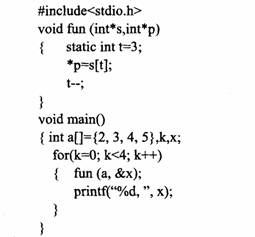下列程序的运行结果是( )。A)5,4,3,2,B)2,3,4,5,C)2,2,2,2,D)5,5,5,5,
下列程序的运行结果是( )。

A)5,4,3,2,
B)2,3,4,5,
C)2,2,2,2,
D)5,5,5,5,
相关考题:
下列程序的运行结果是()。includevoid fun(int*s,int*p){ static int t=3;*p=s[t];t--; 下列程序的运行结果是( )。#include<stdio.h>void fun(int*s,int*p){ static int t=3; *p=s[t]; t--;}void main(){ int a[]={2,3,4,5),k; int x; for(k=0;k<4;k++) { fun(a,x); printf("%d,",x); }}A.5,4,3,2B.2,3,4,5,C.2,2,2,2,D.5,5,5,5,
下列程序的运行结果是()。includevoid fun(int*s,int*p){static int t=3; *p=s[t]; t-- 下列程序的运行结果是( )。 #include<stdio.h> void fun(int*s,int*p) { static int t=3; *p=s[t]; t--; } void main() { int a[]={2,3,4,5},k; int x; for(k=0;k<4;k++) { fun(a,x); printf("%d,",x); } }A.5,4,3,2B.2,3,4,5,C.2,2,2,2,D.5,5,5,5,
下列程序的运行结果是()。 include voidfun(int*s,int*p) {static int t=3; *p=s[t]; t 下列程序的运行结果是( )。#include<stdio.h>voidfun(int*s,int*p){ static int t=3;*p=s[t];t--;}void main(){ int a[]={2,3,4,5},k;int x;for(k=0;k<4;k++){ fun(a,x);printf("%d,",x);}}A.5,4,3,2B.2,3,4,5,C.2,2,2,2,D.5,5,5,5,
下列程序的运行结果是( )。 void fun(int*s,int*p) {static int t=3; } void main() {int a[]={2,3,4,5},k,x; printf("%d,",x): }A.5,4,3,2,B.2,3,4,5,C.2,2,2,2,D.5,5,5,5,
下列程序的运行结果是()。includevoid fun (int*s,int*p){ static int t=3; *p=s [t]; 下列程序的运行结果是( )。 #include<stdio.h> void fun (int*s,int*p) { static int t=3; *p=s [t]; t--; } void main() int a[]={2, 3, 4, 5},k; int x; for(k=0; k<4; k++) { fun (a, x); printf("%d,", x); }A.5,4,3,2B.2,3,4,5,C.2,2,2,2,D.5,5,5,5,
下列程序的运行结果是( )。 #includestdio.h void fun(int*S,int*p) { static int t=3: *p=s[t]; t--; } void main { int a[]={2,3,4,5),k; int x; for(k=0,k4,k++) { fun(a,&x); printf("%d,",x); } }A.5,4,3,2B.2,3,4,5C.2,2,2,2D.5,5,5,5
下列程序的运行结果是( )。#includestdio.hvoid fun(int*S,int*p){ static int t=3:*p=s[t];t--;}void main{ int a[]={2,3,4,5),k;int x;for(k=0,k4,k++){ fun(a,&x);printf(%d,,x);}}A.A.5,4,3,2B.2,3,4,5C.2,2,2,2D.5,5,5,5